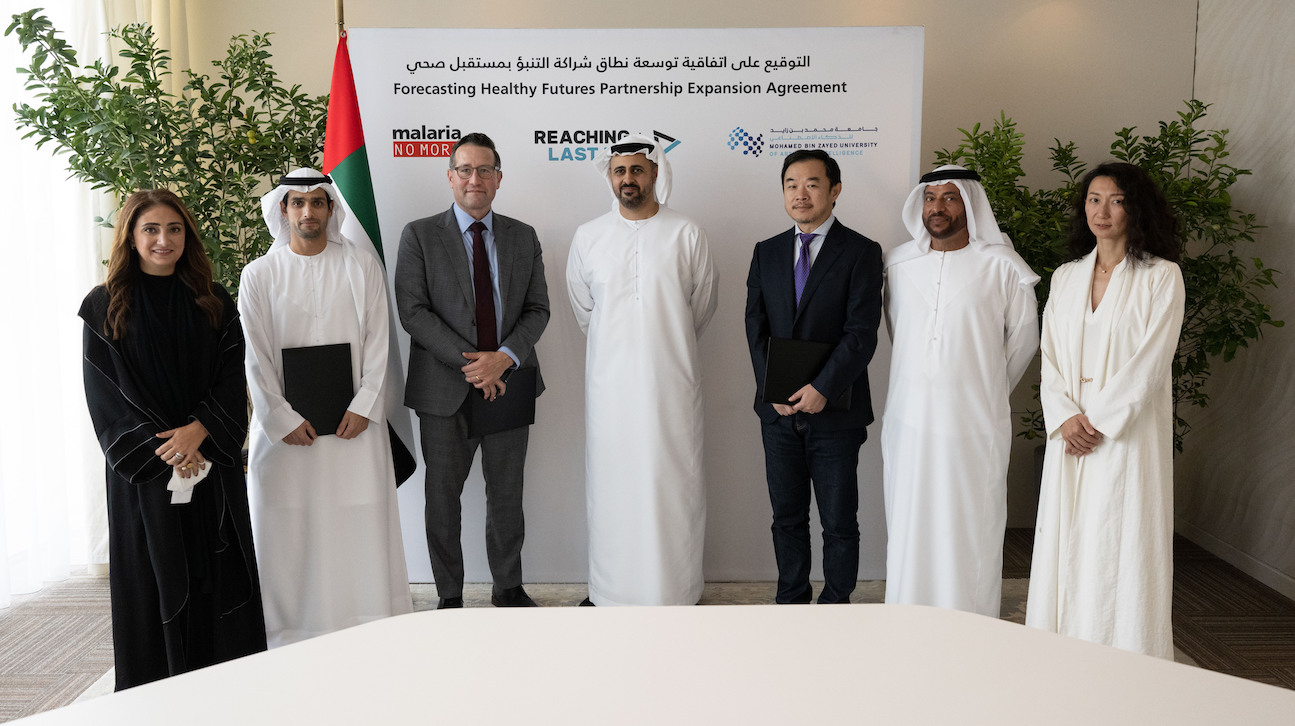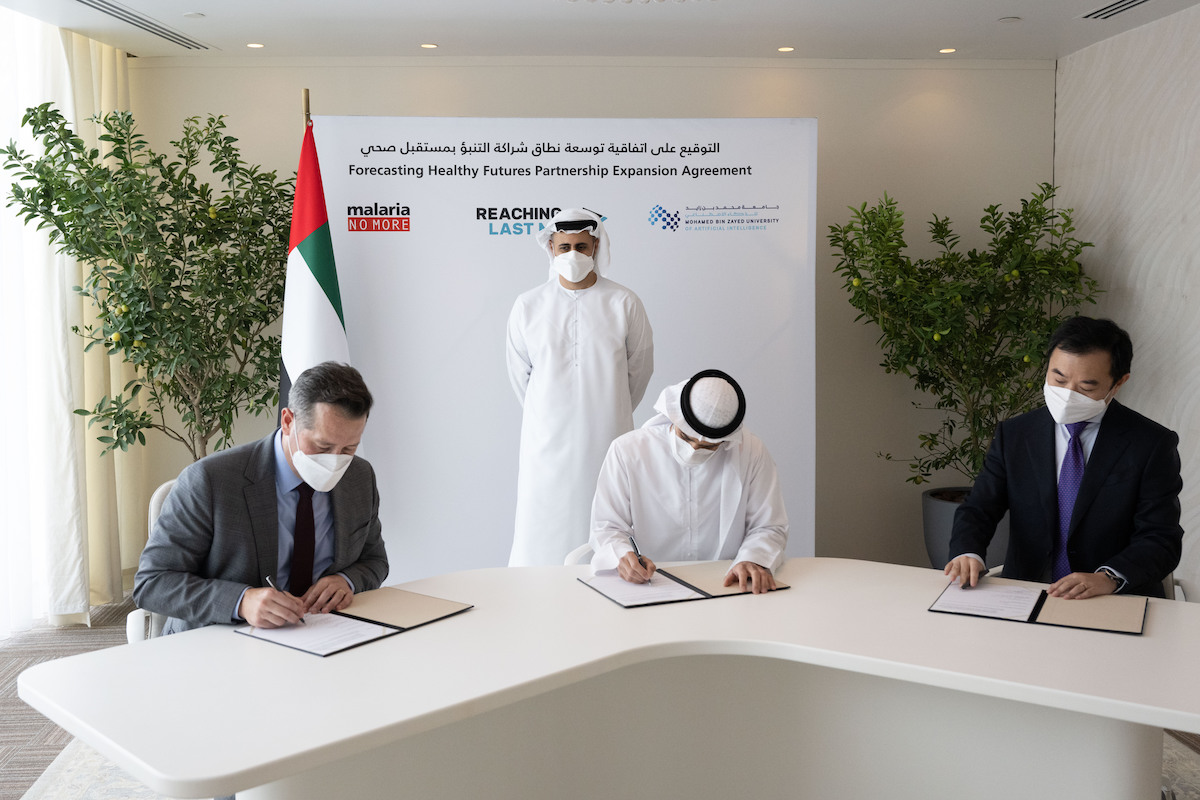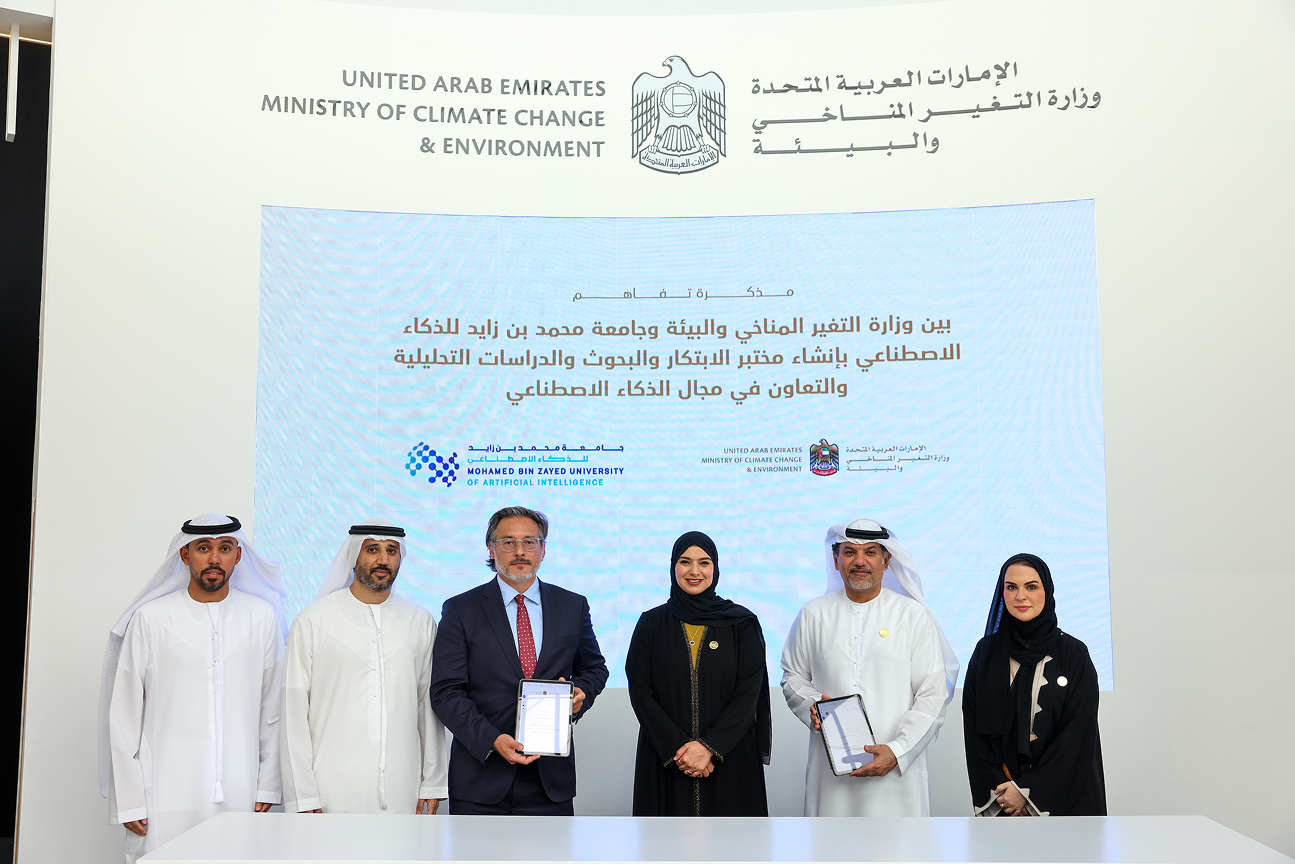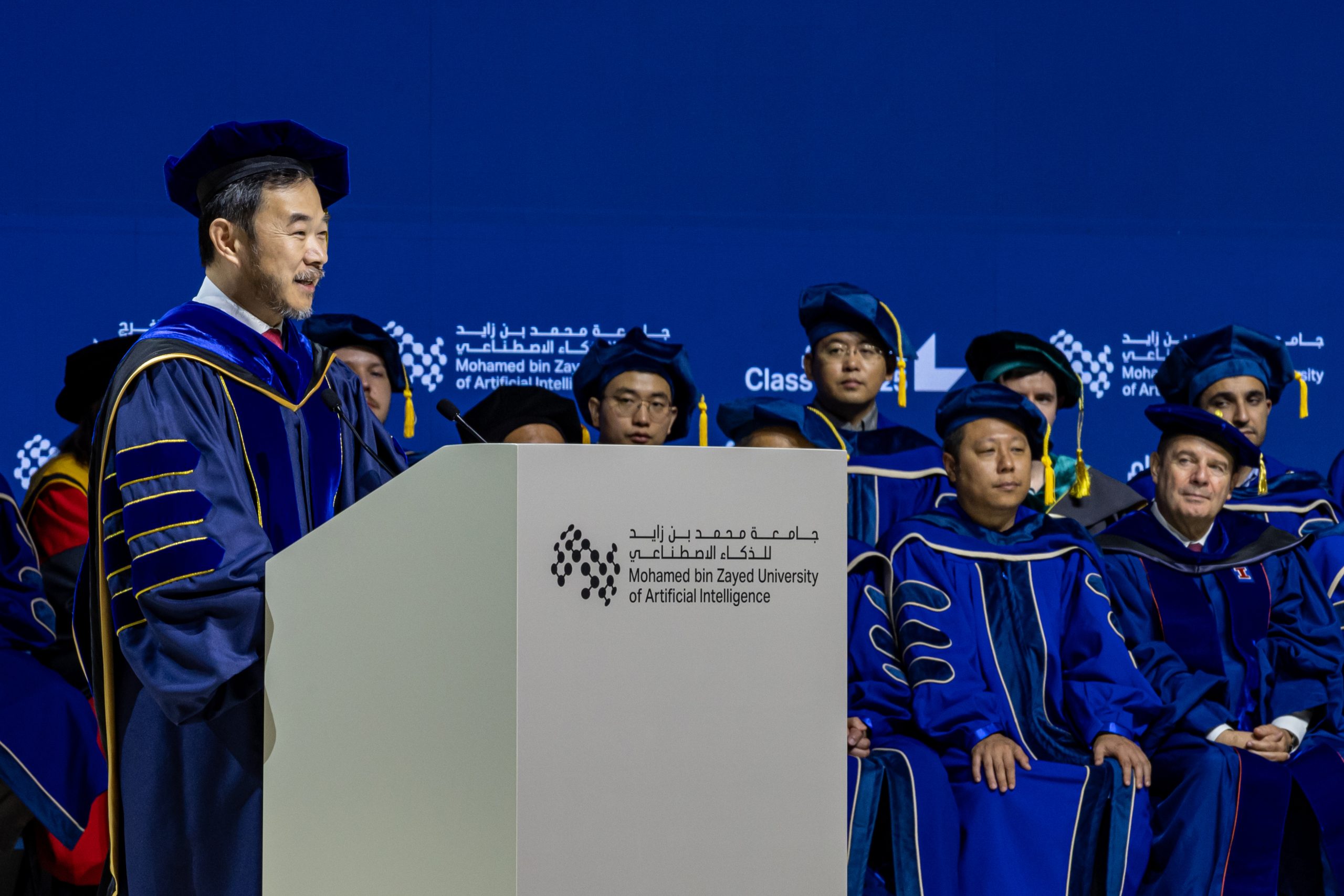MNM, RLM, and MBZUAI sign expansion of climate and health initiative
Wednesday, January 04, 2023

In early January, 2023, H.H. Sheikh Theyab bin Mohamed bin Zayed Al Nahyan, Member of the Executive Council, witnessed the Malaria No More (MNM) announcement of the expansion of its climate and health initiative, Forecasting Healthy Futures (FHF), through a new three-year, US$5 million award from the Reaching the Last Mile initiative (RLM).
The expanded partnership was signed by Nassar Al Mubarak, representing Reaching the Last Mile; Martin Edlund, CEO of Malaria No More, and Professor Eric Xing, President of Mohamed bin Zayed University of Artificial Intelligence (MBZUAI).
“We are proud to be offering our renewed commitment to Forecasting Healthy Futures, and hope that this marks another milestone in the UAE’s long-standing fight against preventable diseases, which started decades ago with our Founding Father, the late Sheikh Zayed bin Sultan Al Nahyan,” H.H. Sheikh Theyab commented.
“Today, under the guidance of President His Highness Sheikh Mohamed bin Zayed Al Nahyan, we continue to work hand-in-hand with key players in the field of global health, through meaningful partnerships that create real impact whilst upholding our values of helping those in need and empowering people to live healthier and more dignified lives.”
“We celebrate with great optimism the new heights and potential to reach together. Thanks to the tireless efforts of the FHF team and its partners, supported by our world-class university partners at MBZUAI, we look forward to eradicating this disease and moving closer to a malaria-free world.”

Malaria, one of the world’s oldest and deadliest diseases, devastates families and perpetuates the cycle of poverty in many communities and countries. According to the recently launched World Health Organization’s (WHO) World Malaria Report 2021, malaria caused an estimated 247 million cases and over 619,000 deaths. Three out of four deaths were children under five years old.
Climate and malaria eradication
At a time when climate action is at the top of government agendas across the globe, the impact of climate change on eliminating malaria and other climate-sensitive infectious diseases is an issue that cannot be ignored. Rising temperatures, changing rainfall patterns and extreme weather disrupt health systems and alter the range and seasonality of vector-borne diseases.
One mosquito species in particular – Anopheles stephensi – has expanded its range into urban areas and shows increasing insecticide resistance. As per the WHO report, a new initiative launched in September 2022 aimed at stopping the further spread of A. stephensi by increasing surveillance, improving information exchange and prioritizing research.
Progress towards malaria elimination is increasing. The World Malaria report highlighted that in 2021, 35 endemic countries recorded fewer than 1000 new malaria cases, and five of the highest burden countries recorded a decline in deaths. These successes demonstrate the right tools and funding can save lives.
The latest $5 million USD commitment from RLM builds on an introductory award of $1.5 million USD made in 2020 to assess the feasibility of climate-informed malaria strategies. The initiative also receives support from IBM’s The Weather Company, the Tableau Foundation, and other members.
In January 2022, Forecasting Healthy Futures launched the new Institute for Malaria and Climate Solutions (IMACS), a global institute with the mission to combat malaria in the face of climate change and weather volatility.
Phase 2 of the Forecasting Healthy Futures initiative
- Increase Awareness and Action at the Intersection of Climate Change and Global Health: Educate policymakers, thought leaders and donors on the growing impact of climate change on human health, promoting investment in proactive technology-enabled solutions and the supportive policy reform needed to build resilient health systems.
- Improve the Effectiveness of Disease Early Warning Systems: Expand a network of experts driving the development of sophisticated early warning systems and demonstrate the potential of artificial intelligence and new data sources in creating increasingly accurate forecast and response systems for malaria and other climate-sensitive infectious diseases.
- Support the Implementation of Prediction and Planning Solutions: Provide technical support to health systems to tailor emerging solutions to meet their local needs, integrate with existing systems and data sources, adopt policies and practices needed to sustain them, and validate the impact on disease elimination efforts and cost-effectiveness.
Edlund stated, “Following Egypt, the world now turns its attention and hopes for addressing climate change to the United Arab Emirates and COP28 next year. Given the UAE’s longstanding leadership on disease elimination, it is the ideal place to spotlight the complicating effects of changing climate conditions on diseases like malaria, dengue, zika, and other climate-sensitive disease.”
“With renewed commitment from foundational partners like Reaching the Last Mile, Forecasting Healthy Futures hopes to show a path forward for innovative global health solutions that can protect the health of most vulnerable people and communities in the context of climate change.”
Beginning in December 2022, IMACS will launch operations in Indonesia, alongside Mohamed bin Zayed University of Artificial Intelligence and Indonesian stakeholders from the public sector and academia.
“AI is becoming a powerful tool for researchers and decision-makers to glean crucial insight from massive amounts of data, such as the data we have on malarial pathology and transmission along with its environmental and climate contexts, to develop strategies towards disease eradication,” Professor Xing said.
“Through machine learning, we can analyze tremendous amounts of satellite and atmospheric data in real-time to predict trends and guide the teams on the ground to forecast or identify risks and take action. As the world’s first graduate AI research university, we are honored to support Malaria No More and The Last Mile Foundation in their efforts to free humanity from malaria once and for all.”
Related
MBZUAI to launch lab at UAE’s Ministry of Climate Change and Environment
New lab will support advancing agricultural sustainability in the UAE through research and analysis.
- partnerships ,
- sustainability ,
- agriculture ,
- MoUs ,
- environment ,
- ai lab ,
President’s address to the Class of 2025
MBZUAI President and University Professor, Eric Xing, celebrated the Class of 2025, offering advice and guidance for.....
- commencement ,
- commencement 2025 ,
- Class of 2025 ,
- speech ,
- Eric Xing ,
- alumni ,
- graduation ,
- president ,
- address ,
Advancing cultural diversity through AI
To mark World Day for Cultural Diversity for Dialogue and Development, we look at how MBZUAI is.....
- benchmark ,
- UNESCO ,
- low resource ,
- dialogue ,
- music ,
- inclusion ,
- cultural awareness ,
- culture ,
- language ,
- United Nations ,
- diversity ,
- llms ,
- large language models ,


